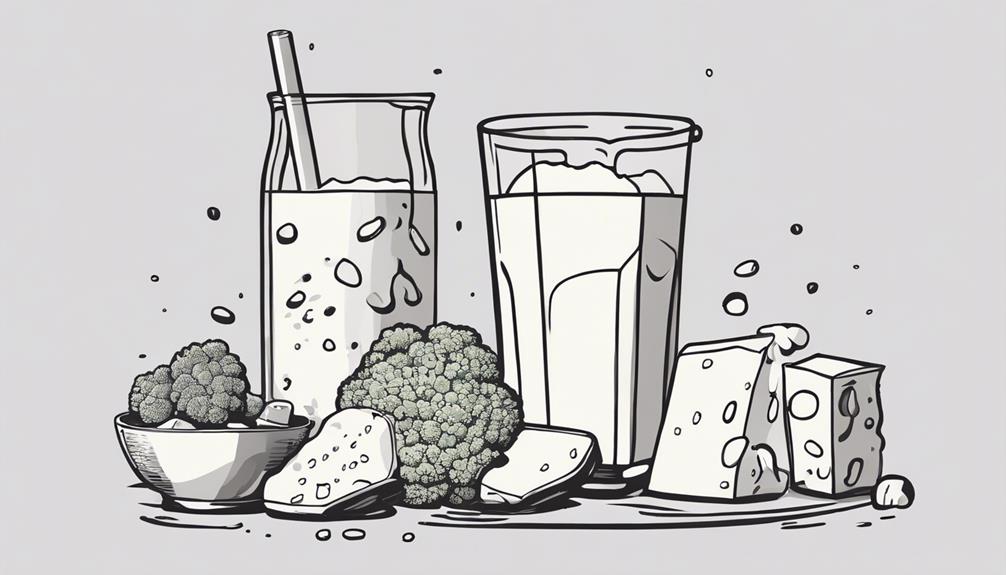Milk, often recognized for its role in bone health, offers a spectrum of health benefits attributable to its nutrient-rich composition. Beyond calcium for bone strength and potassium for heart function, milk contains essential vitamins like vitamin D, influencing not only bone health but also mood regulation. Moreover, its protein content supports muscle growth and repair. However, as with any dietary element, understanding the full scope of benefits and potential considerations surrounding milk consumption is crucial for making informed decisions about its inclusion in a balanced diet.
Key Takeaways
- Milk provides essential nutrients like protein, calcium, and vitamins for overall health.
- Drinking milk supports muscle health, weight management, and better blood sugar control.
- Milk consumption is linked to improved bone, heart, and cognitive health benefits.
- Moderation is key to balancing the benefits of milk consumption and potential risks.
Nutritional Value of Milk

What essential nutrients and proteins does a cup of whole cow's milk provide, making it a valuable addition to a balanced diet? Whole cow's milk is a nutritional powerhouse, offering a range of essential nutrients vital for overall health. In just one cup, you can find 8 grams of high-quality protein, which is crucial for muscle health, repair, and may aid in weight management by promoting satiety and reducing overeating. Additionally, milk is a rich source of calcium, essential for bone strength, and may help lower the risk of osteoporosis and fractures. Vitamin D in milk supports calcium absorption and plays a key role in maintaining bone health.
Furthermore, milk contains a variety of vitamins and minerals such as riboflavin, vitamin B12, phosphorus, and potassium, which are often lacking in many diets. These nutrients contribute to overall well-being and help meet daily requirements for optimal functioning. The antioxidants present in milk, like vitamin E and beta-carotene, provide further health benefits. Including whole cow's milk in your diet can be a simple yet effective way to ensure you are obtaining these vital nutrients for a balanced and nutritious diet.
Essential Vitamins in Milk
Milk serves as a significant source of essential vitamins crucial for various physiological functions and overall health maintenance. Vitamin B2, also known as riboflavin, found in milk, plays a vital role in supporting energy production and antioxidant function within the body. Additionally, Vitamin B12 present in milk is essential for red blood cell formation and neurological health. Milk is a good source of Vitamin A, which is crucial for vision, immune function, and skin health. Furthermore, the Vitamin D content in milk aids in calcium absorption, promoting strong bones and teeth. Potassium, another important nutrient in milk, supports heart health, muscle function, and nerve transmission. Including milk in the diet can help ensure the body receives these essential vitamins necessary for various physiological functions, from red blood cell formation to heart health.
Minerals Found in Milk

An essential component of the nutritional profile of dairy products, including milk, is the presence of various minerals crucial for supporting fundamental physiological functions in the human body. These minerals play key roles in bone health, muscle function, and immune system support. The minerals found in milk include:
- Calcium: Milk is a rich source of calcium, providing about 28% of the daily recommended intake in one cup. Calcium is essential for bone strength and development.
- Phosphorus: With approximately 22% of the daily value per cup, phosphorus in milk is critical for bone health and energy production.
- Potassium: Milk contains around 10% of the daily recommended intake of potassium per cup. Potassium helps regulate blood pressure and supports muscle function.
Additionally, milk is a good source of selenium, providing about 13% of the daily value per cup. Selenium is an important antioxidant mineral that supports immune function and thyroid health. The combination of these minerals in milk contributes to overall health benefits, making it a valuable addition to a balanced diet.
Protein Content in Milk
The protein content in milk serves as a vital component in supporting various physiological functions in the human body, particularly in muscle health and repair. With 8g of protein per cup, milk is a valuable source of this macronutrient. It is classified as a complete protein, containing all essential amino acids necessary for the body. The high-quality proteins present in milk, such as casein and whey, are essential for muscle health and repair processes. Milk consumption may aid in reducing age-related muscle loss and promoting muscle growth. Whey protein, found in milk, is rich in branched-chain amino acids, known for their role in muscle health and recovery. Incorporating milk into the diet can provide these benefits due to its rich content of high-quality proteins, ultimately supporting overall muscle health and function.
Role of Milk in Bone Health

Milk's role in bone health is crucial due to its high calcium and phosphorus content, essential for maintaining bone density and strength. The nutrients present in milk facilitate calcium absorption, reducing the risk of osteoporosis and promoting overall skeletal health. Additionally, the protein found in milk plays a significant role in supporting bone health, especially in preventing bone loss, particularly in women.
Bone Density Support
Rich in essential nutrients crucial for bone health, milk plays a significant role in supporting bone density. The combination of calcium and phosphorus in milk is vital for enhancing bone strength and reducing the risk of osteoporosis. Regular consumption of milk, starting from childhood and continuing into adulthood, contributes to optimal bone health by providing the necessary building blocks for bone formation. Additionally, fortified milk containing vitamin D aids in calcium absorption, which is essential for maintaining bone density. Together, these components in milk work synergistically to promote strong and healthy bones, making it a valuable addition to a balanced diet for overall bone health.
1) Milk provides calcium and phosphorus for bone strength.
2) Regular milk consumption supports optimal bone health.
3) Fortified milk with vitamin D aids in calcium absorption.
Calcium Absorption Aid
Supporting bone health through its role in calcium absorption, milk is a fundamental component in maintaining optimal bone density and strength. Milk contains essential nutrients like calcium, phosphorus, and protein crucial for bone health. These nutrients are vital for preventing conditions such as osteoporosis and reducing the risk of fractures, particularly in the elderly. The protein in milk plays a significant role in protecting against age-related bone loss. By providing a rich source of phosphorus, milk further supports overall bone strength. Regular consumption of milk can contribute to improved calcium absorption, thus enhancing bone health and reducing the likelihood of bone-related issues.
Impact on Weight Management
Milk consumption plays a significant role in weight management due to its high protein content and ability to promote feelings of satiety. This can have various implications for individuals striving to achieve and maintain a healthy weight. Here are some key points to consider:
- High-Protein Content: Milk is a valuable source of high-quality protein, which can help in feeling full and satisfied for longer periods. This can aid in reducing overall calorie intake and potentially support weight loss efforts.
- Conjugated Linoleic Acid: The presence of conjugated linoleic acid in milk is believed to have beneficial effects on metabolism and body composition, potentially assisting in weight management goals.
- Calcium: Diets rich in calcium, such as those incorporating milk, have been associated with a decreased risk of obesity. Calcium may also play a role in preventing weight gain by regulating fat metabolism and helping the body efficiently utilize stored fat for energy.
Incorporating milk into a balanced diet may offer advantages in weight management by promoting satiety, supporting weight loss, and potentially reducing the risk of obesity.
Milk's Relation to Diabetes Prevention

Regular consumption of milk has been linked to a decreased risk of type 2 diabetes due to the beneficial nutrients it contains, such as calcium and vitamin D. These nutrients are thought to contribute to better blood sugar control and insulin sensitivity, potentially aiding in diabetes prevention. Additionally, the protein content in milk may help in managing blood sugar levels and reducing the likelihood of developing diabetes.
Diabetes Risk Reduction
Consumption of dairy products, particularly milk, demonstrates a noteworthy association with the reduction of diabetes risk. The nutrient profile of milk plays a crucial role in improving insulin sensitivity and glucose metabolism, ultimately aiding in maintaining stable blood sugar levels and reducing the risk of type 2 diabetes. Here are three key points to consider:
- Calcium Content: Milk is a rich source of calcium, which has been linked to enhanced insulin sensitivity, potentially decreasing the likelihood of developing diabetes.
- Protein Contribution: The protein content in milk can positively impact glucose metabolism, further supporting the reduction of diabetes risk.
- Overall Nutrient Profile: The combination of essential nutrients in milk contributes to its overall ability to reduce the risk of developing type 2 diabetes.
Milk and Insulin Levels
The correlation between dairy product intake and diabetes risk extends beyond the calcium and protein content, as evidenced by the impact of milk on insulin levels, further elucidating its role in diabetes prevention. Drinking milk may help regulate insulin levels, reducing the risk of developing type 2 diabetes. The proteins in milk can improve insulin sensitivity, promoting better glucose control. Research suggests that regular milk consumption is associated with a lower risk of developing diabetes. Milk's nutrient profile, including calcium and vitamin D, may play a crucial role in diabetes prevention. Including milk in a balanced diet can contribute to overall metabolic health and effective diabetes risk management.
| Key Points | Details |
|---|---|
| Insulin Levels | Milk helps regulate insulin levels, reducing the risk of type 2 diabetes. |
| Glucose Control | Proteins in milk improve insulin sensitivity, aiding in glucose control. |
| Diabetes Risk | Regular milk consumption is linked to a lower risk of developing diabetes. |
Milk and Heart Health
Milk's impact on heart health stems from its rich potassium and calcium content, which are associated with potential benefits in blood pressure regulation and cardiovascular risk reduction. Here are three key points to consider:
- Blood Pressure Regulation: Consuming milk, with its potassium content, may help lower blood pressure, supporting overall heart health. Potassium is known for its role in vasodilation, which can positively impact blood pressure levels.
- Cardiovascular Risk Reduction: The calcium and potassium found in milk play a crucial role in blood vessel dilation. This dilation can potentially reduce the risk of cardiovascular diseases by improving blood flow and lowering the strain on the heart.
- Reduced-Fat Milk Options: Opting for reduced-fat milk can support heart health while still providing essential nutrients. Including milk in a balanced diet may contribute to a decreased risk of heart disease and stroke. By choosing milk as part of your daily intake, you are actively promoting a healthy heart and overall well-being.
Cognitive Benefits of Milk Consumption

The cognitive benefits associated with milk intake extend beyond its cardiovascular advantages, encompassing impacts on brain function and cognitive performance. Studies have shown that drinking milk is linked to a reduced risk of cognitive decline and lower Alzheimer's disease risk. Adequate levels of vitamin D in milk play a crucial role in supporting serotonin production, which in turn can impact mood, appetite, and even sleep patterns. The nutrients present in milk, such as calcium and potassium, are essential for overall brain health. Regular consumption of milk has been associated with improved brain function, cognitive performance, and memory retention. By incorporating milk into a balanced diet, individuals may potentially enhance their cognitive abilities and reduce the risk of cognitive impairments associated with aging. These cognitive benefits underline the importance of milk consumption not only for physical health but also for maintaining optimal brain function and cognitive well-being.
Potential Risks of Excessive Milk Consumption
Excessive consumption of milk has been linked to several potential health risks, including an increased incidence of prostate cancer and a higher likelihood of fractures associated with heightened height. When considering the risks of consuming milk in excess, it is essential to weigh the following factors:
- Prostate Cancer: Studies have suggested a correlation between high intake of milk and an increased risk of prostate cancer. The exact mechanisms behind this association are still under investigation, but moderation in milk consumption may be advisable for prostate health.
- Fractures: While high milk intake may contribute to increased height, it does not necessarily translate to a reduced risk of hip fractures. Some research indicates that there is no clear link between consuming milk and decreased hip fractures, challenging the common belief that milk consumption inherently strengthens bones.
- Bone Health: Surprisingly, high calcium intake during adolescence, often promoted for bone health, may not offer the expected protection against bone loss in later years. In contrast, fermented dairy products like yogurt have been associated with more health benefits compared to plain milk, emphasizing the importance of considering alternative sources of dairy for overall well-being.
Milk and Cancer Risk

Current research indicates that milk consumption may play a role in both reducing the risk of colon and rectal cancers, while potentially increasing the risk of prostate cancer. The relationship between milk intake and specific cancer risks remains a topic of ongoing investigation to provide a clearer understanding of its impact on tumor development. As such, it is essential to carefully consider the potential benefits and risks associated with milk consumption in the context of cancer prevention strategies.
Cancer Prevention Benefits
Drinking milk's impact on cancer risk varies depending on the type of cancer and the balance of its beneficial and potential risk factors. When considering cancer prevention benefits associated with milk consumption:
- Colon and Rectal Cancer: Milk's calcium and vitamin D content may lower the risk of these cancers.
- Prostate Cancer: Some studies suggest that high milk intake could potentially increase the risk of prostate cancer.
- Risk Moderation: While milk offers cancer prevention benefits, moderation is crucial to balance associated risks and make personalized dietary choices. Different cancers may respond differently to milk consumption, emphasizing the importance of individualized dietary decisions. Further research is necessary to fully comprehend the relationship between milk intake and cancer development.
Milk and Tumor Development
The association between milk consumption and tumor development remains a subject of ongoing investigation in cancer research. High milk intake has been linked to an increased risk of prostate cancer. While some studies suggest a potential connection between milk consumption and higher rates of certain tumors, conclusive evidence on the relationship between milk intake and specific cancers is still lacking. Interestingly, milk may have a protective effect against colon and rectal cancers, but it could potentially elevate the risk of prostate cancer. To understand the impact of milk intake on tumor development comprehensively, further research is imperative. The intricate interplay between milk and tumors underscores the complexity of assessing cancer risk concerning milk consumption.
Saturated Fats in Milk
Saturated fats present in milk have been identified as a concern due to their potential impact on cholesterol levels and cardiovascular health. When considering the saturated fat content in milk, it is crucial to understand its implications for overall health:
- Whole Milk vs. Reduced-Fat Options: Whole milk contains approximately 3 grams of saturated fat in an 8-ounce serving, while reduced-fat milk options have lower saturated fat content. Opting for reduced-fat varieties can help in moderating saturated fat intake.
- Cholesterol Levels and Heart Health: Saturated fats in milk have the potential to increase cholesterol levels, which can negatively affect heart health. High saturated fat intake from whole milk may contribute to an increased risk of cardiovascular diseases.
- Importance of Moderation: Consuming milk with saturated fats should be practiced in moderation to maintain a balance between its nutritional benefits and the potential risks associated with saturated fat intake. Prioritizing reduced-fat milk options can be a healthier choice for supporting overall cardiovascular health.
Lactose Intolerance and Milk Allergy

Concerns related to milk consumption extend beyond saturated fats, as lactose intolerance and milk allergy pose significant challenges for individuals with varying degrees of tolerance to milk components. Lactose intolerance, affecting around 65% of the global population, results from the body's inability to digest lactose, causing symptoms like gas, bloating, and diarrhea. Those with lactose intolerance can turn to lactose-free milk or lactase enzyme supplements to aid in digestion.
On the other hand, milk allergy involves an immune system response to milk proteins, leading to severe allergic reactions such as hives, swelling, and breathing difficulties. It is crucial for individuals with lactose intolerance or milk allergy to carefully read food labels and seek guidance from healthcare professionals for suitable dietary adjustments.
Understanding the distinctions between lactose intolerance and milk allergy is essential for managing these conditions effectively. By utilizing lactose-free alternatives and seeking medical advice, individuals can navigate these challenges while still potentially benefiting from the nutritional value that milk offers.
Frequently Asked Questions
Is It Good to Drink Milk Daily?
Incorporating milk into daily dietary habits can be beneficial due to its contribution to essential nutrients like calcium, vital for bone health, muscle recovery, and weight management. Regular milk consumption aids in nutrient absorption, supports digestive health, and may have positive effects on the immune system, skin, and heart health. The decision to drink milk daily aligns with promoting overall well-being through the diverse health benefits it offers.
What Does Milk Do for the Body?
Milk plays a vital role in supporting various aspects of human health. It contributes to bone health by providing essential nutrients like calcium and vitamin D, crucial for maintaining bone strength. Additionally, milk's proteins aid in muscle growth and repair, while its potassium content benefits heart health by promoting blood vessel dilation. These combined benefits showcase milk as a well-rounded beverage that supports overall bodily functions.
Why Milk Is the Healthiest Drink?
Milk stands out as the healthiest drink due to its unparalleled nutrient profile. Its richness in calcium promotes bone strength, while proteins aid in muscle recovery and weight management. Additionally, milk supports digestive health, heart health, and boosts the immune system. Its nutrient powerhouse nature also enhances skin health and provides an energy boost. These combined benefits make milk a crucial component of a well-rounded, health-conscious diet.
What Kind of Milk Is Healthiest?
When considering the healthiest type of milk, factors such as individual dietary needs and preferences play a crucial role. Options like almond, soy, oat, and skim milk offer lower fat and calories compared to whole milk. Almond milk is popular for being lactose-free, while soy milk provides a good source of plant-based protein. Ultimately, the healthiest choice varies based on nutritional requirements, making it essential to select the most suitable option for optimal health.
Conclusion
In conclusion, the consumption of milk offers a myriad of health benefits due to its rich nutritional content. Just as a sturdy foundation supports a building, milk provides essential nutrients like calcium, potassium, vitamin D, and proteins that are crucial for maintaining strong bones, muscles, and overall well-being. However, it is important to be mindful of potential risks associated with excessive milk consumption and to consider individual factors such as lactose intolerance or milk allergies.
